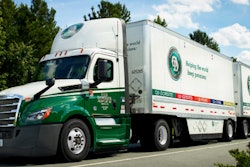
Swedish company's driverless, electric Pods come to the U.S.
The Swedish freight technology company Einride recently announced its remotely-driven trucks are now operating in the U.S.
The company also said it has signed Bridgestone and GE Appliances as customers for its trucks -- called Pods -- that have no driver onboard, but which are operated remotely by a person at a console.
“The U.S. freight market is one of the most competitive and to be an industry leader you need to play in this league'" said Robert Falck, Einride founder, and CEO. "We have the technology and solution to bring the biggest change in the freight industry since the adoption of the diesel truck 100 years ago.”
The trucks will start by operating in private freight yards. The company said it plans to gradually move the vehicles to public highways, a move the company said may take years. Einride also said its US fleet could become the first fully autonomous and all-electric trucks in the world to run on public roads.
Einride said it has also hired the world’s first remote truck driver, who will be revealed at an event later this year.
Biden announces plans to improve supply chain issues
In response to headline-grabbing backups at West Coast ports, the White House earlier this week released details of how the $1.2 trillion infrastructure bill will help make port and freight system improvements, including a truck parking assessment.
One of the immediate actions is to alleviate congestion at Georgia’s Port of Savannah, which will include funding the Georgia Port Authority’s pop-up container yards project. This project allows the GPA to reallocate more than $8 million to convert existing inland facilities into five pop-up container yards in Georgia and North Carolina.
Under the plan, the Port of Savannah will transfer containers via truck and rail further inland so that they can be closer to their final destination, which will make available valuable real estate closer to the port, the White House says. The effort will free up more dock space and speed goods flow in and out of the port.
President Joe Biden's plan also calls for improving key ports of entry within the next 90 days. The plan will identify $3.4 billion in investments to upgrade obsolete inspection facilities and allow more efficient trade through the country’s northern and southern borders.
Additionally, the Department of Transportation will issue revised guidance on State Freight Plans that incorporate best freight planning practices. The White House says the infrastructure bill strengthens the freight plans that states are currently required to produce to include supply chain cargo flows, an inventory of commercial ports, the impacts of e-commerce on freight infrastructure, and an assessment of truck parking facilities.
Drought prompts two states to extend HOS waivers
Emergency declarations that waive hours of service regulations for certain truck drivers in North Dakota and Minnesota were recently extended in each state. The waivers in each state were first granted due to extreme drought conditions affecting the livestock industries in the states.
The North Dakota waiver is effective through Nov. 23, while the Minnesota waiver is effective through Dec. 3.
The Federal Motor Carrier Safety Administration’s Western Service Center Regional Field Administrator extended the North Dakota waiver for drivers transporting water and livestock feed, including hay. According to the waiver, more than 90% of the state is under severe drought conditions resulting in a significant impact on maintaining adequate supplies of water and livestock feed.
Minnesota Gov. Tim Walz renewed his state’s declaration, which has been in effect since July. Over 35% of the state is still in severe or extreme drought, according to the waiver. In Minnesota, drivers hauling hay, forage, and supplemental feed commodities including but not limited to corn silage, distiller grain, and beet pulp can utilize the waiver.
Senators ask FMCSA to allow 18-year-old interstate truckers
Nearly a dozen Republican senators recently urged the Federal Motor Carrier Safety Administration to lower the legal interstate driving age for CDL holders to 18 to help address the industry’s perceived “driver shortage.”
In a letter sent to FMCSA Deputy Administrator Meera Joshi on Nov. 3, the Senators said the perceived shortage coupled with the nation’s ongoing supply chain issues have been detrimental to the nation’s economy, noting that if not addressed, “inaction to grow America’s pool of truck drivers threatens to drive up shipping expenses, prolong delays, and burden already-strained consumers with additional costs.”
The letter said allowing 18-20-year-old CDL holders to drive interstate would “get American goods and services moving again.”
A wave of retiring drivers “exacerbated by the COVID-19 pandemic, produces severe consequences in an already delicate supply chain,” the senators said. “While American truckers do their part to help America recover from this devastating pandemic, the FMCSA should strongly consider allowing persons 18 years of age and older to operate commercial vehicles in interstate commerce."
FMCSA has previously proposed an under-21 pilot program, and the bipartisan infrastructure bill passed by the Senate in August includes a provision for an under-21 truck driver apprenticeship pilot program.
Silver Creek Transportation named Small Fleet Champ
Henderson, Kentucky-based Silver Creek Transportation is Overdrive’s 2021 Small Fleet Champ.
Silver Creek was one of three finalists for the award, which was presented recently in Nashville during the National Association of Small Trucking Companies’ annual conference. Rob Hallahan with Hallahan Transport and Nick Hewitt with Professional Transportation Services, Inc. were the other two finalists.
"We just want to say thank you to everybody in here," said Silver Creek President Jason Cowan, speaking from the stage of the Omni Hotel and Convention Center in Nashville. "Nobody does anything by themselves. One of the core principles we have and we believe is that we're all in this together."











